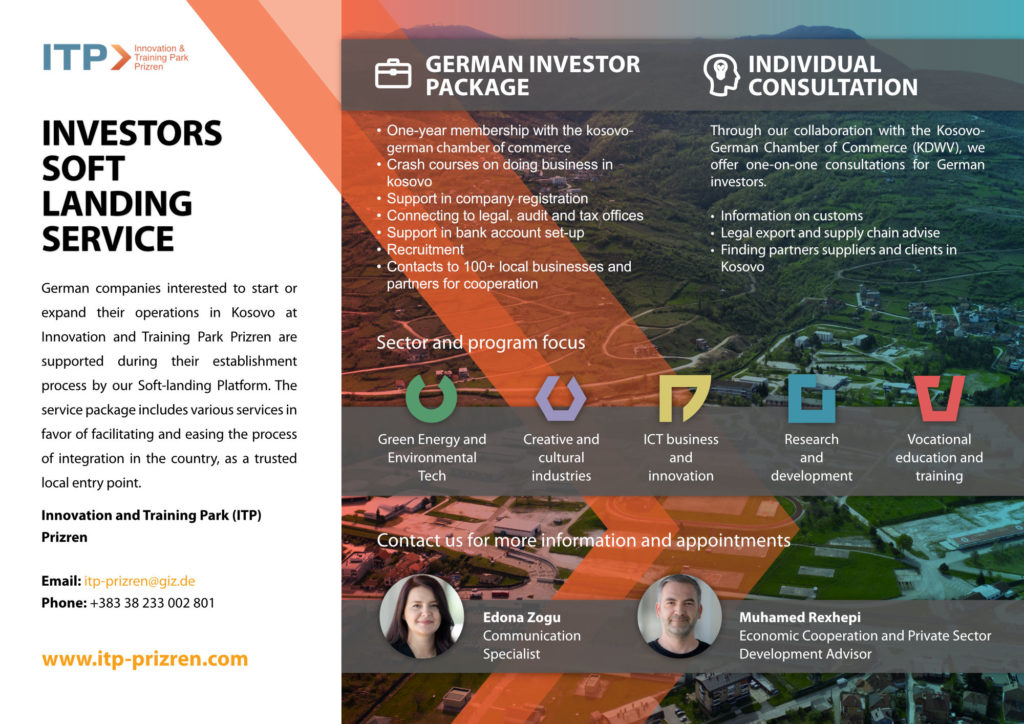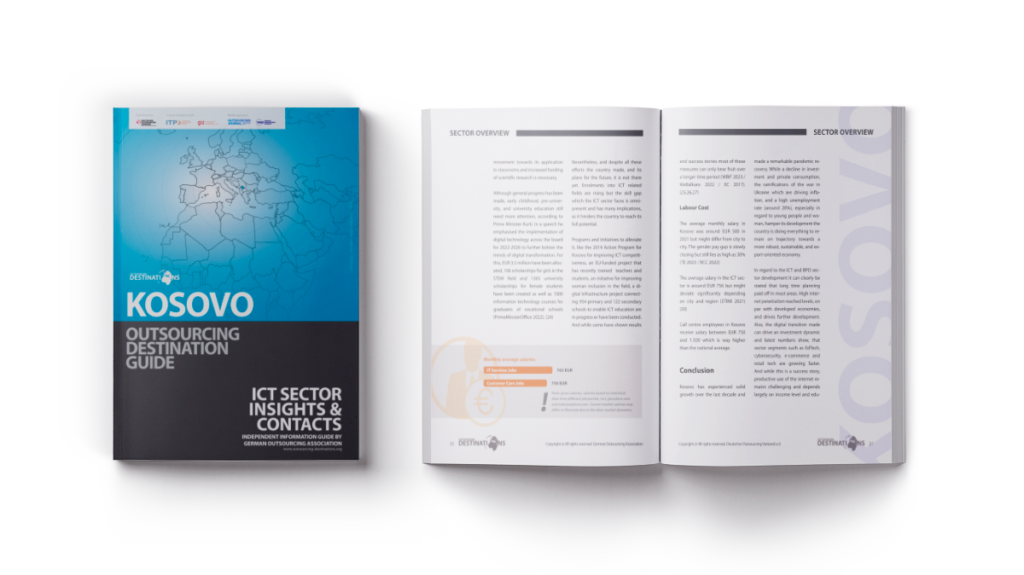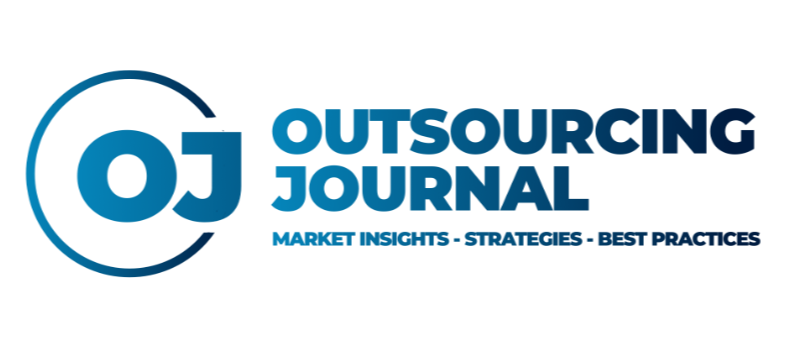Economy
Kosovo is a developing country, with an upper-middle income economy broadly defined and categorised as a developing or emerging economy which peculiarly has no own issued national currency and uses the Euro instead, despite not being a EU member state. Thus, Kosovo has decided to follow a merit based way, securing price stability and reducing transaction costs, while at the same time forgoing their ability to make adjustments to their exchange rate.
The republics gross domestic product (GDP) for 2021 was $9.41 billion, estimated $9.5 billion for 2022 and its GDP based on purchasing power parity (PPP) is $23.32 billion. Nominal GDP per capita in 2022 was $5,230 and GDP (PPP) per capita $14,352 (World Bank 2022 / IMF 2022 / ASK 2022).
Kosovo is driven by its services sector which contributes around 74% of GDP, followed by the industrial sector with ≈18%, and the agriculture sector with ≈12%. In addition, the ICT sector (including telecommunications) has become a vibrant part of the economy, providing a major source of employment, contributing 8%-11% of GDP over the past 10 years, and serves as catalyst for the creation of a skilled workforce (CIA Factbook 2023 / European Commission 2020).
Main exports aside from services are mining products like and minerals (23.2%), processed metal as well as metal products (18%), various manufactured articles (16.2%), rubber and plastics and articles thereof (11,1%) along with agricultural products like foodstuffs, beverages like wine, tobacco, and other plant related products (12.7%). Noteworthy are also the construction sector, contributing 9% GDP, which is mostly driven by remittances from the diaspora as well as the development seen in the textile industry (CC Luxembourg MW 2022).
Main export markets are the EU (especially Germany, Greece, Italy, and Slovenia), Albania, the USA, Serbia, and North Macedonia.
Economic growth over the past decade was above and beyond most expectations. After the pandemic Kosovo made a record recovery in 2021 increasing its GDP 10.5%. However, it has not been enough to provide sufficient jobs and opportunities, particularly for women and the youth. The economic performance in 2022 was less favourable with merely 3.2% real GDP growth which is the result of a decline in investment and private consumption in combination with the ripple effects of the war in Ukraine, which in turn is driving inflation through increased energy, transport, import, and food prices (World Bank 2022 / GET 2021). Nevertheless, Kosovo tries to remain on trajectory towards a more robust, sustainable, and export-oriented economy.
ICT & BPO Sector
The Kosovo Government recognised the strategic and economic importance and consequently declared in 2013 the IT industry development a high priority. In 2014 they started the Action Programme for Kosovo with the title – EU support for the competitiveness of Kosovo’s ICT sector – to bridge the digital and business skills gap in a sustainable manner to increase the competitiveness (EC 2017) and over the past 10 years the sector (including telecommunications) increased employment and performed stable, contributing around 8%-11% to the GDP.
Without telecommunications and BPO services Kosovos ICT sector, which is highly export-oriented, contributes only around 2% to the GDP which is lower than in other countries in the region but indicates potential for further development.
Exports of services from the sector amounted to EUR 99 million in 2021 contributing 5,1% towards all services exports and a steady increase in the number of registered ICT companies could be observed (GET 2022).
The BPO sector up until now includes mainly call centres and support desks, financial transaction processing, and human resource management but scaled well, qualifying and employing more and more people. By 2020 the BPO sector has grown into a stable and solid industry concentrated on three areas:
1. Logistics, sourcing, and distribution services,
2. Information technology services and the creation of software management centres, and
3. BPO ventures like financial transaction processing as well as human resources management.
Main markets for Kosovos BPO sector are in Europe and primarily in the DACH region and most services are network infrastructure support, project management, customer and technical support, telemarketing, and of course call centres.
The Outlook for the whole sector is positive and population projections indicate that more and more of Kosovos young skilled people will enter the labour market in the coming years. This is true especially for the BPO sector who remains very attractive, due to cheaper on-demand skills, travel time, lower costs, and the very good language skills of the Kosovars. (USAID 2021 / GET 2022).

Visit www.itp-prizren.com
Education
The Government and the Ministry of Education, Science and technology (MEST) is aware of the necessity to bridge the skill gap in many industries and especially in the ICT sector which hinders development and causes economic stagnation. Therefore it has drafted the comprehensive – Kosovo Education Strategic Plan (KESP) – for the development of education in the Republic of Kosovo to improve the conditions.
According to the World Bank the government has not only increased spending on education but also rolled out a plan to achieve more effectiveness in the process. Especially in regard to ICT they recognise, that a swifter movement towards its application in classrooms and increased funding of scientific research is necessary.
Although general progress has been made, early childhood, pre-university, and university education still need more attention, according to Prime Minister Kurti. In a speech he emphasised the implementation of digital technology across the board for 2022-2026 to further bolster the trends of digital transformation. For this, EUR 3.5 million have been allocated, 106 scholarships for girls in the STEM field and 1365 university scholarships for female students have been created as well as 1000 information technology courses for graduates of vocational schools (PrimeMinsterOffice 2022).
Nevertheless, and despite all these efforts the country made, and its plans for the future, it is not there yet. Enrolments into ICT related fields are rising but the skill gap which the ICT sector faces is omnipresent and has many implications, as it hinders the country to reach its full potential.
Programs and Initiatives to alleviate it, like the 2014 Action Program for Kosovo for improving ICT competitiveness, an EU-funded project that has recently trained teachers and students, an initiative for improving woman inclusion in the field, a digital infrastructure project connecting 954 primary and 122 secondary schools to enable ICT education are in progress or have been conducted. And while some have shown results and success stories most of these measures can only bear fruit over a longer time period (WBIF 2023 / WeBalkans 2022 / EC 2017).
Labour Cost
The average monthly salary in Kosovo was around EUR 500 in 2021 but might differ from city to city. The gender pay gap is slowly closing but still lies as high as 30% (TE 2023 / RCC 2022)
The average salary in the ICT sector is around EUR 756 but might deviate significantly depending on city and region (STIKK 2021)
Call centre employees in Kosovo receive salary between EUR 750 and 1.500 which is way higher than the national average.

Read the full article and more insights in the Outsourcing Destination Guide Kosovo by German Outsourcing Association: https://www.outsourcing-destinations.org/portfolio/outsourcing-destination-guide-kosovo/
